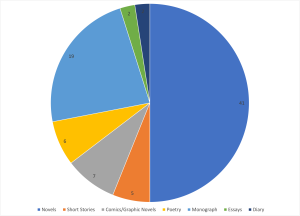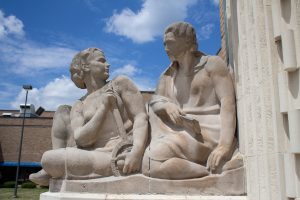I read 66 books this year. I set a goal of 52, or a book per week; obviously I did more than that, but still a lot less than last year. That was a deliberate decision. By the end of last year, reading started to feel competitive (even though I was not actually competing with anybody in particular), and I was choosing shorter books just to get my numbers up. That, and the fact that I subscribed to several magazine this year, made me want to set a more modest goal, and focus more on both quality and what I wanted to be than on the numbers.
Of those 66 books, 25 were novels. That is a much lower proportion than previous years, and again that was a deliberate choice; I set out to read more essays, poetry, and short stories this year. I really only partly met that goal, I read 10 books of poetry, 5 of essays, and 4 of short stories, of which probably only poetry is really an improvement over previous years. I also read five graphic novels (or similar types of things) and two of biography or memoir (not, generally, a genre/form that I read much). There were 5 additional books which I’m grouping under general non-fiction, which includes everything from Richard Haass’s Foreign Policy Begins at Home to Richard Benson’s F for Effort.
The remaining books were read for work, either for teaching or as part of a research project. Those are all non-fiction, either political science or history. Many were about indigenous peoples, either in the United States or (this year) in Brazil; others, read for courses I taught, ranged from electoral politics (Sasha Issenberg’s The Victory Lab) to changing gender roles and their relation to economic shifts (Hannah Rosin’s The End of Men).
Of this year’s books, 15 were published in 2013 (which exceeds my goal of at least 10), and 4 were translated from another language (which was a surprise, and comes nowhere near my goal of 15).
All in all, I’m happy with the quantity of my reading this year, I’d still like to change up the mix just a bit and read more poetry, essays, and history this year. (That would also go a ing way toward clearing off the “to read” shelf in our apartment).
I’m certainly not going to try to sum up all of these, but I thought I’d say a little bit about some of my favorites. These are not in any kind of order, and they are books I read this year, not necessarily books that were published this year (though, as it turns out, they are all quite recent). They are just a few of the books that stuck with me, that I’ve been recommending to friends, or that for one reason or another stuck with me.
May We Be Forgiven, by A.M. Homes
This was probably the big surprise of the year for me. I had never heard of either the author or the book; I read it because it was a book group selection, and it turned out to be, probably, my favorite book of the year. It is entirely impossible to summarize, and the publisher’s attempt to do so on the book jacket only results in giving one the wrong impression. It begins with a man named Harold, whose very successful but not very likable brother George is in a car accident which results in the deaths of most of a family. While George in recovering in the hospital, Harold begins an affair with his wife, and when George sneaks out of the hospital an finds them in bed together he kills her; Harold must then take over the care of George’s home and children while George is institutionalized and waiting trial. That is maybe the first 40 pages of the book, and from there it just gets weirder and weirder. Homes makes it work by maintaining an utterly relentless pace; before you can begin to reflect on how bizarre things have gotten, something else happens and carries you along. That makes it sound like some kind of trick, but it doesn’t feel like one. One of the remarkable things about May We Be Forgiven is that nothing about it ever signals the kind of book that it is going to be; there’s nothing about the premise or the initial events or the style that tells you how strange this is going to be. Instead, everything about it points to a familiar kind of literary, domestic drama, but this is not at all that. It is also much, much funnier than the setup would lead one to believe.
How to Get Filthy Rich in Rising Asia by Mohsin Hamid
That this book was good was much lesssurprising, if only because I’d seen a number of strong reviews for weeks before I read it; what was less expected was how much it has stuck with me since I read it. The central conceit of the novel—that it is written as though it were a self-help book— could easily become a mere gimmick, but the book almost immediately transcends it. While it is written entirely in the second person, there is actually a strong and nuanced character at the center, into whose life “you” are placed and through whose eyes you see the trajectory of a life in a place of tremendous economic possibility, but also insecurity and instability. It is funny and bittersweet and the writing is deceptively simple, leaving a deep impression despite seeming almost weightless.
Among the Barbarians by Daniel Mendelson
Writing good criticism— by which I mean criticism that both lends insight and makes the reader think differently about whatever is being considered and is, itself, great writing— is really hard. Writing good criticism about as wide a range of things and Daniel Mendelson does seems impossible. There is intelligence and insight on every page, he makes connections between works and ideas that seem miles apart, and he treats “low” culture with as much respect and thoughtfulness as “high.” The piece on Madmen is still one of my favorite critical essays, if only because it articulates a sense that I had but could never express clearly. And, speaking of that piece, Mendelson also knows how to write strongly negative criticism without it ever sounding spiteful or mean-spirited. When he does not like something, his dislike is not simply catty (he is never that) or amusingly pointed (he is often that); his negative reviews are just as revelatory and thought-provoking as the positive ones. And, in point of fact, very few of these pieces are, actually, entirely positive or negative, but nuanced and based on careful, sometimes very fine distinctions. You will be smarter for reading this.
The Amazing Adventures of Kavalier and Clay by Michael Chabon
This book won a Pulitzer Prize and who knows what else, so I’m just arriving late to the party, but it really is as good as you’ve heard. There are books that are long because they are stuffed full of plot, or long because they expend pages of text detailing every nuance of feeling and sentiment, or long because some editor did not do their job. This book is long because it contains, as completely as possible, a whole world, rich and varied and full of sadness and joy and everything else. This kind of stuffed-to-the-rafters exuberance could be annoying if handled less deftly, but Chabon can write so well that it feels not exhaustive (or exhausting) but, simply, complete.
Transfer of Qualities by Martha Ronk
This was the last book I read this year, and it was a good way to close out 2013. A collection of prose poems about material objects, as well as the relations between them, between them and us, and the relationships they help to build between us and other people, places, and events. That sounds like an abstract intellectual exercise, but it does not read that way at all. Some of these are almost a kind of mini-essay, and at their best they distill the everyday cathexis that is so familiar but so often dismissed or ignored into language that is simple but powerful.
Susan Sontag: The Complete Rolling Stone Interview by Jonathan Cott
Susan Sontag fascinates me; thought I have actually read relatively little of her own writing (something I mean to correct in 2014), I’ve read a lot about her, and I am attracted to the kind of ravenous curiosity and openness with which she approached the world. (It may sound overwrought, but I think she would like the word “ravenous” there, since she rejected any distinction between thinking and feeling, between the body and mind). I get a sense that she would actually be a pretty difficult, if not actually unpleasant, person to know, at least some of the time, but I would like to approach the world the way she did; she wanted to know everything, thought everything was worth knowing, and took a a deep and genuine pleasure in thinking and knowing. This interview covers a lot of ground, and more than anything it shows how fluidly her mind moved across subjects, genres, and points of view.
And that’s it for 2013.


